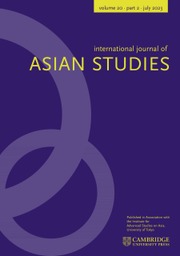No CrossRef data available.
Article contents
PERFORMING IDENTITIES: TWO CHINESE RITES IN SOUTHERN THAILAND
Published online by Cambridge University Press: 21 July 2008
Abstract
The cults and ritual practices of the Sino-Thai communities of southern Thailand are a distinctive aspect of a region in which Chinese heritage has a high degree of social significance. Chinese came to the Malay Peninsula in several waves; many settlers arrived as early as the sixteenth century, and others flooded into the region to work in tin-mines and rubber plantations in the nineteenth century. Although now “Thai” in many respects, the descendants of Chinese immigrants in the south retain a distinctive identity, visibly expressed in the annual ritual cycle focused on specific rites and temples. These events provide a sense of connection to ancestral origins, but also make important statements about the contemporary position of Chinese descendants in a complex multiracial context. Tourism, both national and transnational, has played an important role in the expansion of ritual performance. During the capitalist boom years of the 1990s, elements of Chinese identity became a valued social marker in Thailand and some aspects of the southern cultural and ritual practices were adopted more widely, although most of the Sino-Thai descendants outside the south had little or no understanding of the origins or meaning of the practices. This paper examines rites performed annually in two southern Thai towns, investigating how they reflect complex negotiations of ethnic identity vis-à-vis national and regional contexts.
- Type
- Research Article
- Information
- Copyright
- Copyright © Cambridge University Press 2008




